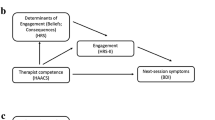Abstract
This study examined the relationships between acceptance of the treatment rationale (ATR), homework compliance, and change during cognitive-behavioral therapy (CBT) for depression. By evaluating the associations between these variables over time it was possible to compare competing theories of change in CBT. Clients meeting criteria for major depression (N = 150) were assessed longitudinally for their reaction to the treatment rationale and homework compliance over the course of a 20-session treatment. The results suggest that both ATR and homework compliance make independent contributions to predicting within-treatment change and treatment outcome. There was no evidence that compliance mediates the effect of ATR on treatment outcome. These findings support a multiprocess model of change in CBT. Acceptance of the treatment rationale may facilitate involvement in treatment and nonspecific change processes, while compliance with homework assignments contributes to additional change. We discuss these findings in regard to alternative theories of change and the dissemination of CBT to real-world clinical settings.
Similar content being viewed by others
REFERENCES
Addis, M. E., & Jacobson, N. S. (1996). Reason-giving and the process and outcome of cognitive-behavioral psychotherapies. Journal of Consulting and Clinical Psychology, 64, 1417-1424.
Arkowitz, H. (1992). A common factors therapy for depression. In Norcross, J. C., & Goldfried, M. R. (Eds.), Handbook of psychotherapy integration (pp. 402-432). New York: Basic Books.
Baron, R. M., & Kenny, D. A. (1986). Themoderator-mediator variable distinction in social psychological research: Conceptual, strategic, and statistical considerations. Journal of Personality and Social Psychology, 51, 1173-1182.
Beck, A. T., & Greenberg, R. L. (1974). Coping with depression. New York: Institute for Rational Living.
Beck, A. T., Rush, A. J., Shaw, B., & Emery, G. (1979). Cognitive therapy of depression. New York: Guilford Press.
Beck, A. T., Ward, C., Mendelson, M., Mock, J., & Erbaugh, J. (1961). An inventory for measuring depression. Archives of General Psychiatry, 4, 561-571.
Beutler, L. E., Engle, D. E., Mohr, D., Daldrup, R. J., Bergan, J., Meredith, K., & Merry, W. (1991). Predictors of differential response to cognitive, experiential, and self-directed psychotherapeutic procedures. Journal of Consulting and Clinical Psychology, 59, 333-340.
Burns, D. D., & Nolen-Hoeksema, S. (1991). Coping styles, homework compliance, and the effectiveness of cognitive-behavioral therapy. Journal of Consulting and Clinical Psychology, 59, 305-311.
Burns, D. D., & Nolen-Hoeksema, S. (1992). Therapeutic empathy and recovery from depression in cognitive-behavioral therapy: A structural equation model. Journal of Consulting and Clinical Psychology, 60, 441-449.
Cohen, J., & Cohen, P. (1983). Applied multiple regression/correlation analysis for the behavioral sciences (2nd ed.). Hillsdale, NJ: Erlbaum.
Dobson, K. S. (1989). A meta-analysis of the efficacy of cognitive therapy for depression. Journal of Consulting and Clinical Psychology, 57, 414-419.
Edelman, R. E., & Chambless, D. L. (1993). Compliance during sessions and homework in exposure-based treatment of agoraphobia. Behavior Research and Therapy, 31, 767-773.
Elkin, I., Shea, T., Watkins, J. T., Imber, S. D., Sotsky, S. M., Collins, J. F., Glass, D. R., Pilkonis, P. A., Leber, W. R., Docherty, J. P., Fiester, S. J., & Parloff, M. B. (1989). National Institute of Mental Health treatment of depression collaborative research program: General effectiveness of treatments. Archives of General Psychiatry, 46, 971-982.
Fennel, M. J. V., & Teasdale, J. D. (1987). Cognitive therapy for depression: Individual differences and the process of change. Cognitive Therapy and Research, 11, 253-271.
Frank, J. D. (1973). Persuasion and healing: A comparative study of psychotherapy (2nd ed.). Baltimore, MD: Johns Hopkins University Press.
Hamilton, M. (1960). A rating scale for depression. Journal of Neurology, Neurosurgery and Psychiatry, 23, 56-61.
Hollon, S. D., DeRubeis, R. J., & Evans, M. D. (1987). Causal mediation of change in treatment for depression: Discriminating between nonspecificity and noncausality. Psychological Bulletin, 102, 139-149.
Ilardi, S. S., & Craighead, W. E. (1994). The Role of nonspecific factors in cognitive-behavior therapy for depression. Clinical Psychology: Science and Practice, 1, 138-156.
Jacobson, N. S., Dobson, K. S., Truax, P., Addis, M. E., Koerner, K., Gollan, J. K., Gortner, E., & Prince, S. E. (1996). A component analysis of cognitive behavioral treatment for depression. Journal of Consulting and Clinical Psychology, 64, 295-304.
Morrison, L. A., & Shapiro, D. A. (1987). Expectancy and outcome in prescriptive vs. exploratory psychotherapy. British Journal of Clinical Psychology, 26, 59-60.
Persons, J. B., Burns, D. D., & Perloff, J. M. (1988). Predictors of dropout and outcome in cognitive therapy for depression in a private practice setting. Cognitive Therapy and Research, 12, 557-575.
Rude, S. S., & Rehm, L. P. (1991). Response to treatments for depression: The role of initial status on targeted cognitive and behavioral skills. Clinical Psychology Review, 11, 493-514.
Simons, A. D., Garfield, S. L., & Murphy G. E. (1984). The process of change in cognitive therapy and pharmacotherapy for depression. Archives of General Psychiatry, 41, 45-51.
Spitzer, R. L., Williams, J. B. W., Gibbon, M., & First, M. B. (1989). Structured Clinical Interview for DSM-III-R-patient version (with psychotic screen). New York: Biometrics Research Department.
Startup, M., & Edmonds, J. (1994). Compliance with Homework Assignments in cognitive-behavioral psychotherapy for depression: Relation to outcome and methods of enhancement. Cognitive Therapy and Research, 18, 576-579.
Whisman, M. A. (1993). Mediators and moderators of change in cognitive therapy of depression. Psychological Bulletin, 114, 248-265.
Zeiss, A. M., Lewinsohn, P. M., & Munoz, R. F. (1979). Non-specific improvement effects in depression using interpersonal skills training, pleasant activity schedules, or cognitive training. Journal of Consulting and Clinical Psychology, 47, 427-439.
Author information
Authors and Affiliations
Rights and permissions
About this article
Cite this article
Addis, M.E., Jacobson, N.S. A Closer Look at the Treatment Rationale and Homework Compliance in Cognitive-Behavioral Therapy for Depression. Cognitive Therapy and Research 24, 313–326 (2000). https://doi.org/10.1023/A:1005563304265
Issue Date:
DOI: https://doi.org/10.1023/A:1005563304265




